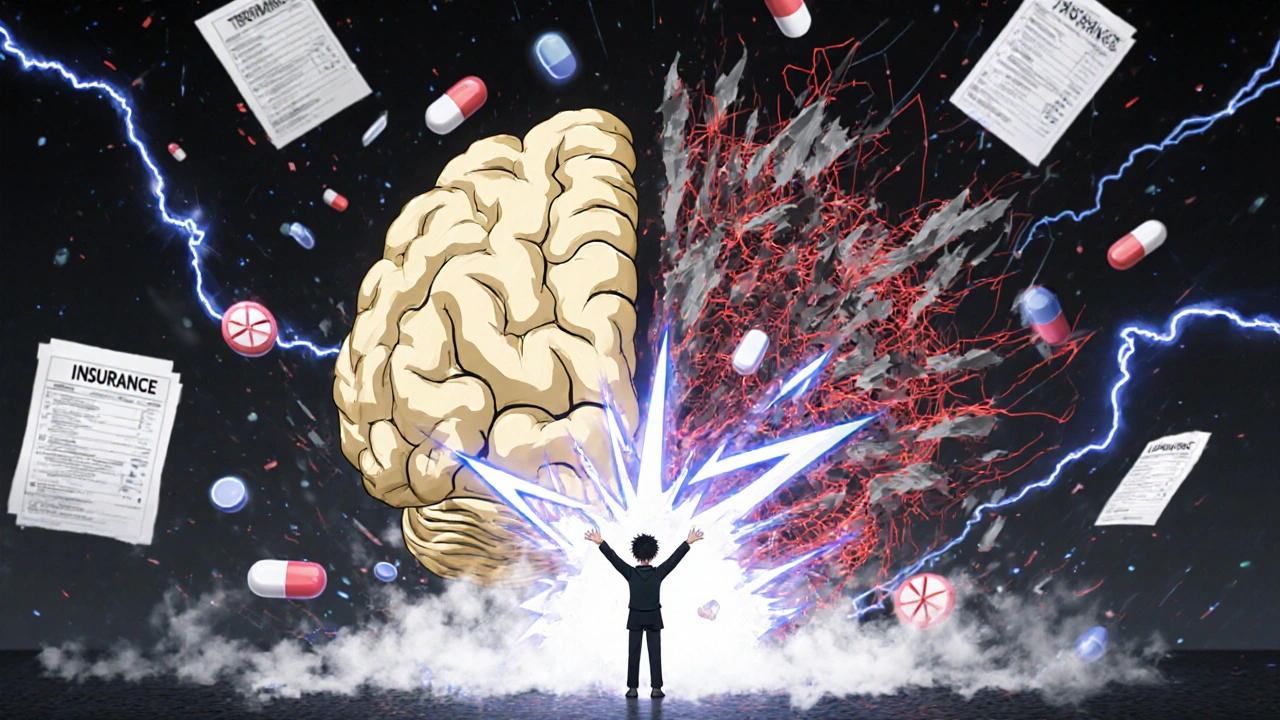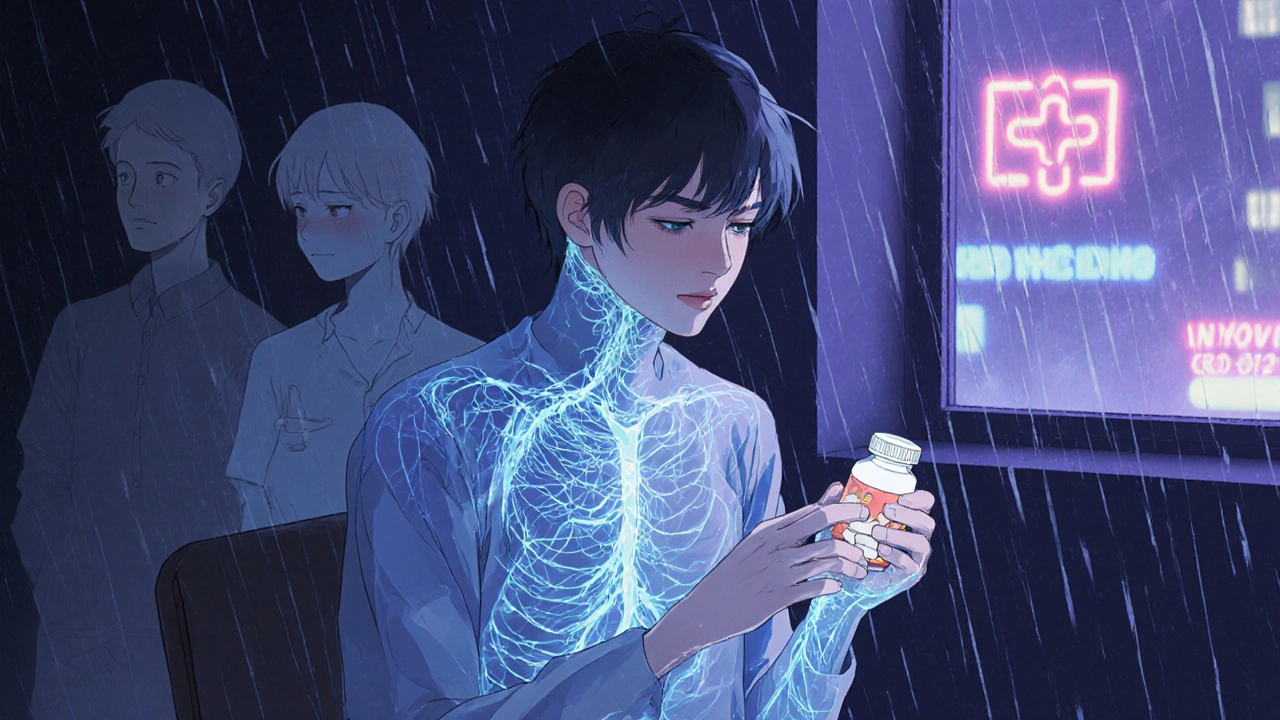Changing your psychiatric medication isn’t just a swap in pills-it’s a shift in how you feel, think, and even see yourself. For many people, switching from one antidepressant, antipsychotic, or anti-anxiety drug to another feels like losing a part of who they’ve become. It’s not just about side effects or chemical balance. It’s about identity, trust, and the quiet fear that you might never feel like yourself again.
Why Switching Feels Like Losing Yourself
When you’ve been on a psychiatric medication for months or years, your brain adapts. Not just chemically, but psychologically. You start to associate stability with that pill. You remember the days before it-how you couldn’t get out of bed, how your thoughts raced, how you felt numb or terrified all the time. Then, the medication helps. Slowly, you rebuild your life. You go back to work. You talk to friends again. You sleep through the night. Then, your doctor says it’s time to switch. It might be because the drug stopped working. Or your insurance won’t cover it. Or you were switched to a generic version without being told. Suddenly, the thing that kept you grounded starts to slip away. People report feeling like strangers in their own bodies. One Reddit user wrote: “I felt like a different person. Like the real me had been buried under the meds, and now I was just floating.” A 2023 study from King’s College London found that over 11% of people on antidepressants switched medications within 90 days. And for many, the psychological toll was worse than the original symptoms. Withdrawal symptoms-dizziness, electric-shock sensations in the head, brain zaps, nausea-aren’t just physical. They trigger panic. They make you question: Is this me? Or is this the drug leaving?The Hidden Psychological Phases of Switching
Research from Frontiers in Psychiatry identified three distinct psychological stages people go through during medication changes:- Loss of self - This happens when you’re on the medication and feel stable. You don’t think about it. It’s just part of your life. But when you’re told to stop, you realize how much of your identity was tied to that pill. You start to fear what happens without it.
- Accumulating trauma - This is the messy middle. You’re tapering off one drug, starting another. You get brain zaps. You cry for no reason. You feel like you’re going backward. One patient described it as “a junky who needs the drug.” That’s not hyperbole. For many, the withdrawal feels like addiction, even when they weren’t addicted.
- Rebuilding stability - Only 35% of people reach this stage after two years. It’s not about finding the perfect drug. It’s about accepting that your mental health journey isn’t linear. You learn to live with uncertainty.
Generic Switches Are Worse Than You Think
You’ve probably heard that generics are just as good as brand-name drugs. And in most cases, that’s true. But for psychiatric medications, it’s not that simple. A 2019 review by Dr. Pierre Blier found that switching between different generic versions of the same drug-say, from one company’s paroxetine to another’s-was just as likely to cause problems as switching from brand to generic. The issue isn’t the label. It’s the switch itself. Why? Because even tiny differences in how the drug is absorbed can throw off your brain’s delicate balance. A pill with a slightly different filler, coating, or release profile can mean the difference between feeling stable and falling apart. Case after case confirms this. One patient switched from brand-name sertraline to a generic and spent three weeks completely emotionally numb. Then came panic attacks-something she hadn’t had in two years. She ended up in the hospital. And here’s the kicker: in many cases, patients weren’t even told they were being switched. Insurance companies do it automatically. Pharmacies do it to save money. Doctors sometimes don’t catch it until the patient shows up in crisis.
Who Gets Left Behind
Not everyone experiences switching the same way. Your income, education, and access to care make a huge difference. Data from the UK Biobank shows that people with university degrees were 25% less likely to switch antidepressants than those without a high school diploma. Why? Because they had more access to specialists, more time to advocate for themselves, and more knowledge to ask the right questions. Meanwhile, people earning under $30,000 a year were 33% more likely to have negative psychological outcomes after a switch. They’re more likely to be switched without warning. More likely to be on multiple meds. More likely to have no one to talk to about how they’re feeling. It’s not just about the drug. It’s about power. Who gets to decide what you take? Who gets to tell you it’s time to change?What Doctors Don’t Always Tell You
Primary care doctors now manage 85% of mental health prescriptions in the U.S. and Canada. That’s a good thing-more people are getting help. But most haven’t been trained in how to safely switch psych meds. A 2022 survey found that 61% of family doctors felt unprepared to handle cross-tapering-the process of slowly reducing one drug while introducing another. Many still use the old method: stop one, start another. That’s a recipe for destabilization. And when patients report feeling worse, they’re often told: “It’s just withdrawal. It’ll pass.” But what if it doesn’t? What if the new drug doesn’t work? What if you’re stuck in a cycle of switching, each time feeling more broken than before? Dr. K. N. Roy Chengappa, a leading psychiatrist, says: “The psychological impact of switching is often underestimated. Patients feel betrayed. They lose trust in their treatment-and sometimes in their doctors.”How to Switch Safely (If You Have To)
If you’re being asked to switch, don’t panic. But don’t agree without asking the right questions:- Why are we switching? Is it because the drug stopped working? Or because your insurance dropped coverage?
- Is this a brand-to-generic switch? If so, ask if you can stay on the brand. Some insurers will approve it if you show medical necessity.
- What’s the tapering plan? Never stop abruptly. Antidepressants like paroxetine (half-life: 21 hours) need slower tapers than fluoxetine (half-life: 96 hours). A 2-4 week taper is standard. Anything faster increases risk.
- Who will monitor me? Weekly check-ins during the switch are critical. If your doctor won’t schedule them, ask for a referral to a psychiatrist.
- What symptoms should I watch for? Brain zaps, increased anxiety, suicidal thoughts, emotional numbness-these aren’t normal. Report them immediately.

When Switching Is Necessary
Not all switches are bad. Sometimes, a new medication is exactly what you need. Some people switch from an SSRI to an SNRI and finally feel like themselves again. Others move from a sedating antipsychotic to one with fewer cognitive side effects and regain their focus. In the NAMI 2022 survey, 28% of people reported improved psychological function after switching. The key is control. If you’re part of the decision, if you understand why, and if you’re supported through the process-it can work. But if the switch is forced, rushed, or done without your input? That’s when the damage happens.The Bigger Picture
The psychiatric medication market is worth over $33 billion. Insurance companies, pharmacies, and even some drug manufacturers benefit from switching. The system is built to move people quickly from one pill to the next. But your brain isn’t a machine. You’re not a cost-saving metric. The FDA is finally starting to take this seriously. In 2022, they released draft guidance acknowledging that bioequivalence standards for CNS drugs may not reflect real-world therapeutic outcomes. A new surveillance system, set to launch in 2024, will track psychological outcomes from 25 million patient records. Digital tools like Pear Therapeutics’ reSET app are helping too. In trials, it cut switching-related hospitalizations by 27% by tracking mood, sleep, and adherence. But technology won’t fix a system that treats patients like numbers. Real change means listening. It means giving people time. It means honoring the fact that your mental health isn’t just about chemistry-it’s about your story.What You Can Do Right Now
If you’re on psychiatric medication:- Keep a mood journal. Note how you feel before, during, and after any change.
- Ask for a copy of your prescription history. Make sure you know what you’re on and when it changed.
- Don’t be afraid to ask for a second opinion. You have the right to know why a switch is being recommended.
- If you feel worse after a switch, don’t wait. Contact your provider immediately. Don’t assume it’s “just withdrawal.”
- Find a community. Reddit, NAMI, and PatientsLikeMe aren’t just forums-they’re lifelines. You’re not alone.
Changing medication isn’t a failure. But it shouldn’t be a gamble either. Your mind deserves more than a quick fix. It deserves care, patience, and respect.
Can switching antidepressants make you feel worse?
Yes. Many people experience worsened anxiety, depression, brain zaps, dizziness, or emotional numbness during a switch. These aren’t always temporary. A 2023 study found that 71% of patients who were switched to generic versions of paroxetine or citalopram without their knowledge experienced symptom relapse or worsening. The act of switching itself-regardless of drug type-is a major risk factor.
Is it safe to switch from brand-name to generic psychiatric meds?
It can be, but it’s not risk-free. For some people, even tiny differences in how generics are formulated can disrupt brain chemistry. Studies show switching between different generic versions of the same drug causes just as many problems as switching from brand to generic. The issue isn’t the label-it’s the change. Always ask your doctor or pharmacist if you’re being switched, and request to stay on the same formulation if you’re stable.
How long does it take to adjust after switching meds?
It varies. Withdrawal symptoms can start within days and last weeks. The new medication usually takes 4-8 weeks to reach full effect. But psychological adjustment-rebuilding trust in your treatment, feeling like yourself again-can take months. Some people never fully recover if the switch was abrupt or poorly managed. Slow cross-tapering and weekly monitoring reduce this timeline significantly.
Why do doctors switch medications without telling patients?
Often, it’s because insurance companies automatically substitute cheaper generics. Pharmacies do it to reduce costs. Many primary care providers aren’t trained to track these changes or don’t have time to inform patients. A 2023 report found only 37% of electronic health records include protocols for documenting medication switches. Patients are often unaware until they start feeling worse.
Can switching meds cause suicidal thoughts?
Yes. The National Alliance on Mental Illness (NAMI) found that 37% of people experienced suicidal ideation during medication transitions. This risk is highest when switching abruptly, especially with SSRIs or SNRIs. Withdrawal can trigger intense emotional instability. If you have thoughts of self-harm during a switch, contact your provider immediately-even if you think it’s “just withdrawal.”

8 Comments
been there. switched from lexapro to a generic sertraline and felt like my brain was full of static. took 3 weeks to even get out of bed. no one warned me. just got the script and went 'cool'. dumb.
so you’re telling me people can’t handle a little chemical adjustment? grow up. your brain isn’t a snow globe you shake and expect it to stay pretty.
bro why are you even on these meds? just go outside. walk. breathe. stop relying on pills to be human. i’ve been off everything for 5 years. i’m fine. you can be too.
hi friend, i know this feels scary. in india, many people think meds are 'weakness' - but i took them for 8 years and now i help others do it safely. you're not broken. you're adapting. take it slow. breathe. you got this 💪
the pharmacokinetic variability in CNS generics is profoundly underappreciated in primary care settings. bioequivalence metrics fail to capture neurochemical fidelity, particularly with SSRIs exhibiting narrow therapeutic windows. the absence of standardized monitoring protocols exacerbates iatrogenic destabilization.
lol you people are so dramatic. "i felt like a different person" - wow, what a tragedy. maybe if you didn’t spend 12 hours a day on reddit analyzing your brain zaps, you’d realize you’re just having withdrawal. get a grip. 🤡
my cousin switched meds and now he’s in a psychiatric ward - and the doctor didn’t even tell him it was a generic switch! this is criminal. insurance companies are killing people and no one cares. #medicationcrisis
Thank you, thank you, thank you for writing this. I’ve been on the same SSRI for 7 years. My pharmacy switched me without notice. I had brain zaps for 11 days. I cried every night. I called my doctor. They said, "It’s normal." It wasn’t. I’m not alone. I’m not crazy. I’m just trying to survive. Please, if you’re reading this - speak up. Ask for your prescription history. Demand to know what you’re taking. You deserve more than a cost-cutting algorithm.
Write a comment